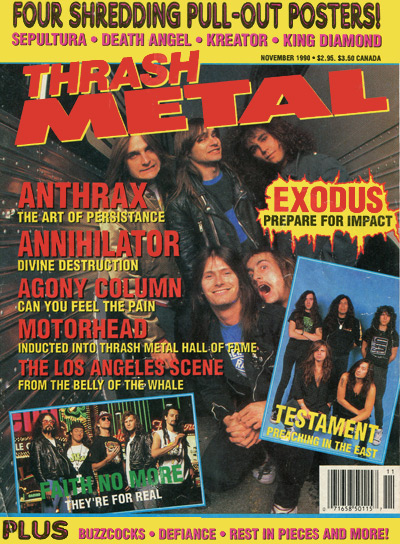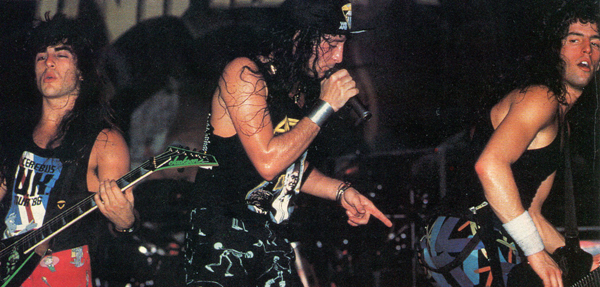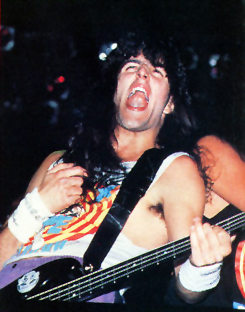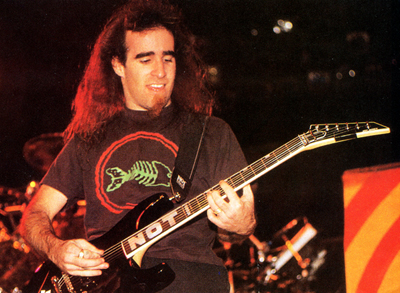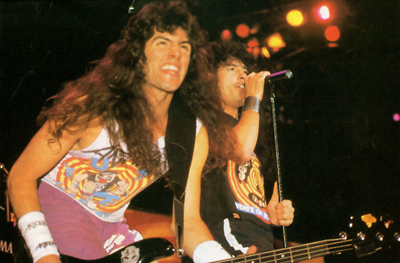
| Search JoyZine with Google Site Search! |
Anthrax interview by Steve Peters
It's hard to believe that The Persistence of Time is Anthrax's fifth album in the last five years, the thrash scene has grown to mammoth dimensions, and as one of the first bands to come from New York's hardcore scene, Anthrax has grown right along with it. We spoke with vocalist Joey Belladonna, bassist Frankie Bello and guitarists Scott "Not" Ian and Dan Spitz as they were putting the final touches on the album in a studio in Los Angeles (drummer Charlie Benante, who established a new land speed record when he laid down his tracks for the new record in three short days, had since returned home to New York). Q: What made you decide to record this album in L.A. as opposed to New York or Florida? SCOTT: Climate is a big factor, because we don't like being in New York in the winter doing a record. It's a pain in the ass. The reason we didn't want to go to Florida again was because of the lack of quality down there. You really have a hard time if something technically goes wrong in the studio. The tape machine broke down during the last album and it took us three days to get the thing fixed, or get a new one in there. You can't deal with that. When you're on a budget or a schedule, it's just a real pain in the ass. Out here, if something goes down, they'll have something else in an hour because you've got 8,000 studios out here. Q: Has the recording of this album gone pretty well? SCOTT: Oh, yeah. We haven't had any downtime or anything. It's been amazing. Real smooth. Q: When you arrived in L.A., was all the material finished and ready to go? DAN: It was all together. Everything.
SCOTT: We spent a lot of time writing and then, even once the songs were done, we spent about six weeks playing the stuff, living with it, making sure we were happy with it and changing things. We didn't want to do anything in the studio. We did that the last time on State of Euphoria, writing shit in the studio and changing things. You can't get a real strong performance on your record if you have to read lyrics that were just written and you really don't know them and stuff like that, or you're really not sure how parts go in the song. We did that last time, and we definitely didn't want to do it again. FRANKIE: There was no chance to let it sink in [on the last album], and if it doesn't sink in, you don't do it as well. DAN: We took as much time as we wanted this time to write, plus we had time off before we even started, which is something we never had [before]. SCOTT: We took three months off before we even started writing. That's the first break we've had in this band—since the five of us have been together—in six years. It's the first time we actually, consciously didn't do anything with the band. We just went our separate ways. JOEY: We got away from everything to do with the band. Everything. We didn't deal with the band at all. We just got away on our own, which was nice. Q: So were there a lot more song ideas floating around when you finally did get back together?
SCOTT: That's what was great. When we finished in Europe in July, if we would've tried to go right in and start writing the record, we would have just ended up banging our heads against the wall for two months, and then we would have gotten sick of each other. It was great taking a break, because everyone got to do whatever they wanted to, and just clear their heads and hang out. When we came in last October and started writing, there wasn't one spot during the writing where we even sat around for more than a day without coming up with something. Everything was really fresh again and everyone was really hungry to do it after taking all that time off, rather than, "Oh shit, we've gotta go write an album 'cause we've gotta be in the studio by this date and we have to have it out by this time." We just weren't gonna do that again after doing it for all those records. Q: Since you were more prepared coming into the studio than you might have been in the past, did you do a lot of stuff more or less live? SCOTT: It went much faster. Charlie did his drums in three days. I don't think you can get much "liver" than that. That's serious spontaneity. Most of the stuff was on the first take, just 'cause we were so ready. FRANKIE: You just know what you're playing. You know what you want to do and just go in and do it. That's it. That's what everybody did. People who hear the drums on this record... I mean, he does shit on this record far beyond what he's done on previous albums. People thought he was a machine before, and then when they find out he did this shit in three days, it's unbelievable. Q: How does the experience of being together as a band for so long help when you go into record a new album now? SCOTT: There's really no surprises in the studio anymore, you know? Working as a band and working in the studio... it's our fifth album now, and we kind of know exactly what we want, even technical stuff. We're more familiar with how the actual shit works, whereas probably two albums ago, I didn't have a clue about anything. Even like the outboard gear and the [mixing] board, I have an idea about how things work. Especially this record, because we had this eight-track machine we were working with, cutting demos for this album, so even working with a simple little thing like that helps. What we used [in the studio] was the same thing but a lot bigger. It's nice to have an idea of what the buttons mean, rather than looking at this sea of lights and numbers and shit and not having a clue! Q: Did you end up recording all of the material that you came into the studio with? SCOTT: Yeah. There'll be 11 tracks on the album, and we recorded five other tracks for B-sides, which we'll probably release as B-sides for 12-inches or something like that. Or, eventually maybe we'll do some kind of EP down the line with other kinds of shit on it. We recorded a lot of stuff. Sixteen songs is the most we ever did. Q: And in the shortest time.
SCOTT: Yeah. We could even be working more, probably. I mean, at this point, we're paid up here [at the studio] until, like, April 8th, so it's not so much pressure. We know we're going to be done by that time, so it's kind of cool. We can fuck with things. We're hoping we'll have time to do some rough mixes before we leave here. We ain't gonna actually mix the record until the beginning of May. Q: Does it ever flip you out that you've recorded five albums now? SCOTT: It's amazing. Five albums! Our deal's almost up with Island [Records] now. I remember first signing the record deal. I remember sitting in the office at Island Records in 1985 and thinking, "God, we're actually gonna sign with a major label!" And now here we are, five albums down the line. It's really incredible. Three of them are gold, you know? I remember when the big deal was like, "Yeah, KISS, their new album has shipped gold I mean, what was Destroyer? That was only their fifth or sixth album, right? So, hopefully, we've got a long way to go. That's the way I look at it, also. The way we work, I don't see why we can't have 10, 12 albums, or more. You never knnow. But we're pretty comforable with the way things are, so I don't see why we wouldn't be able to do it. I guess maybe you just have to take more time off in between each record so you don't want to kill each other. Q: Does it ever get to that point with you guys? SCOTT: On tour. Not in the studio but on tour, yeah. JOEY: On tour it's really heavy for you every day, getting up and sleeping, driving, flying. All that kind of stuff can burn you out. SCOTT: After a certain amount of time you just hit that burnout point [and] where everybody's just at the same place. You've just gotta try and stay away from each other, but everyone starts to rub each other no matter what. You're on a tour bus and it's only so big, you can only get so far away from each other. So you've just gotta try and keep your cool, shut your mouth and focus on playing your show that night. Q: Has Anthrax ever discussed doing a live album? SCOTT: We would put out another video rather than just a live record 'cause at least that way you get both. All a live album usually is, is you usually hear a crowd and the songs are a little bit faster. At least with a vido you can see what's going on. Q: Are the lyrics on the new album still socially and politically concerned?
SCOTT: Yeah, nothing's really changed as far as that goes. All the songs are about real life. There's nothing really even based on Steven King stuff this time around! (laughs) Everything is real life. There's two songs about racism, "Keep It in the Family" and "Hatred." "Keep It in the Family" is about this specific incident in New York—in Brooklyn—last summer, when this kid got shot by these white guys. The song "Hatred" has a broader spectrum about it. It's just about not wasting your time hating somebody because they're different. The song "Discharge" is the other side of "sex, drugs and rock'n'roll." They really glamorize it a lot in the magazines and MTV. That whole lifestyle seems to get glamorized, and it's really not a glamorous lifestyle. The lyrics to this song really show the other side of it. "One Man Stand" was totally inspired by the picture of that guy standing in front of the tanks in China in Tianamen Square. The more I think about it now, with all the shit that's going on now with the stickering and the record labeling and the censorship—I wish I would have been thinking about it more at the time I was writing, 'cause I've got some really good ideas about that. I was even thinking about writing a couple of paragraphs in the liner notes about what's going on. It is censorship. Our government is focusing so much attention on what's going on in Eastern Europe, yet they're passing these censorship laws here in the United States, and it doesn't make any sense. The Berlin Wall comes down, and yet kids aren't going to be able to go out in the U.S. and buy a record that they want to buy. They're telling us what we should be able to listen to and what we should be able to read and what we should be able to see. That's wrong. Q: The album's title, Persistence of Time, sounds like a Dali painting. SCOTT: Exactly. Me and Charlie are both heavily influenced by Salvador Dali's stuff. We didn't want to call it Persistence of Memory after his painting, so we changed it a little bit. Time is kind of an overall theme of the record anyway. And basically it's just about where we are, five albums down the road. We'd like to still be here five years from now, and five years after that, and five years after that. It's pretty much about making your mark and doing things for yourself, standing up and doing something and just not letting shit go by and being lazy. Q: Have you seen any of the darker sides of the music industry in the past five years? SCOTT: We never have a problem, really. We've always run things ourselves. To this day it's still us and our management, Johnny and Marcia Z. We pretty much dictate how everything goes--I mean, from the writing and making of the records to all the promotion and everything. We don't want to let it out to other people because nobody else knows what we want. Nobody else is in the band. There are people who are close to us who we can trust with the responsibility, but the ideas are still coming from us, and that's how we've kept it safe. We've never really gotten fucked that way. Q: Do you plan to be out on the road for a long time in support of this album? SCOTT: We want to be. That's the way we have to do it, you know. DAN: We don't get played on the radio and we don't get played on MTV, and it's what we like to do anyway. I mean, the traveling sucks, but that two hours or hour-and-a-half onstage—that's it. Q: Do you prefer playing live to recording in the studio? SCOTT: Yeah, definitely. It's cool making a record but you don't have 18,000 kids yelling at you when you record it! |
